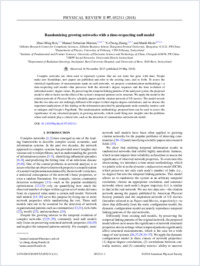Randomizing growing networks with a time-respecting null model
- Ren, Zhuo-Ming Alibaba Research Center for Complexity Sciences, Alibaba Business School, Hangzhou Normal University, Hangzhou, China - Department of Physics, University of Fribourg, Switzerland
- Mariani, Manuel Sebastian Institute of Fundamental and Frontier Sciences, University of Electronic Science and Technology of China, Chengdu, China - URPP Social Networks, Universität Zürich, Switzerland - Department of Physics, University of Fribourg, Switzerland
- Zhang, Yi-Cheng Department of Physics, University of Fribourg, Switzerland - Institute of Fundamental and Frontier Sciences, University of Electronic Science and Technology of China, Chengdu, China
- Medo, Matúš Institute of Fundamental and Frontier Sciences, University of Electronic Science and Technology of China, Chengdu, China - Department of Radiation Oncology, Inselspital, Bern University Hospital, and University of Bern, Switzerland - Department of Physics, University of Fribourg, Switzerland
-
29.05.2018
Published in:
- Physical Review E. - 2018, vol. 97, no. 5, p. 052311
English
Complex networks are often used to represent systems that are not static but grow with time: People make new friendships, new papers are published and refer to the existing ones, and so forth. To assess the statistical significance of measurements made on such networks, we propose a randomization methodology—a time- respecting null model—that preserves both the network's degree sequence and the time evolution of individual nodes' degree values. By preserving the temporal linking patterns of the analyzed system, the proposed model is able to factor out the effect of the system's temporal patterns on its structure. We apply the model to the citation network of Physical Review scholarly papers and the citation network of US movies. The model reveals that the two data sets are strikingly different with respect to their degree-degree correlations, and we discuss the important implications of this finding on the information provided by paradigmatic node centrality metrics such as indegree and Google's PageRank. The randomization methodology proposed here can be used to assess the significance of any structural property in growing networks, which could bring new insights into the problems where null models play a critical role, such as the detection of communities and network motifs.
- Faculty
- Faculté des sciences et de médecine
- Department
- Département de Physique
- Language
-
- English
- Classification
- Physics
- License
-
License undefined
- Identifiers
-
- RERO DOC 322973
- DOI 10.1103/PhysRevE.97.052311
- Persistent URL
- https://folia.unifr.ch/unifr/documents/306910
Statistics
Document views: 136
File downloads:
- pdf: 189
